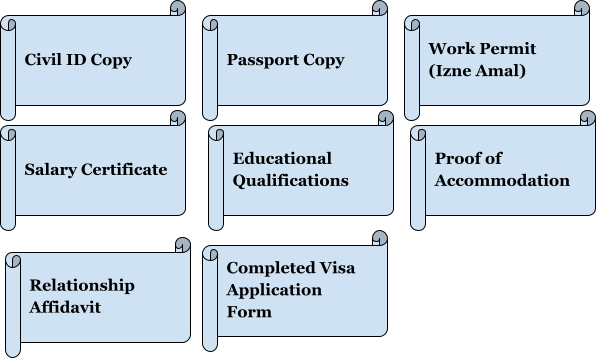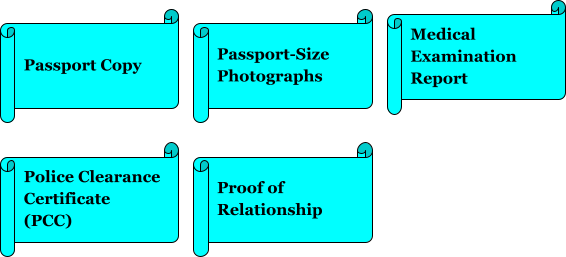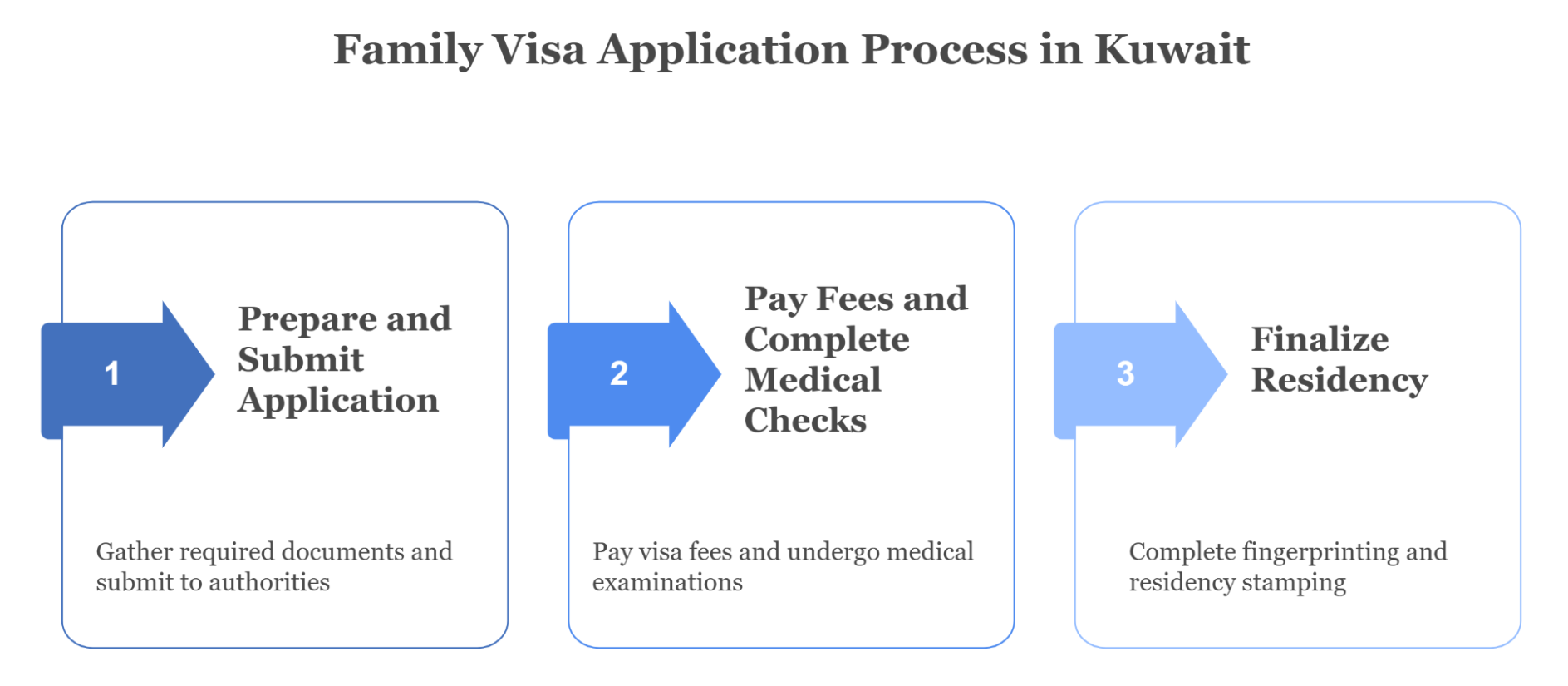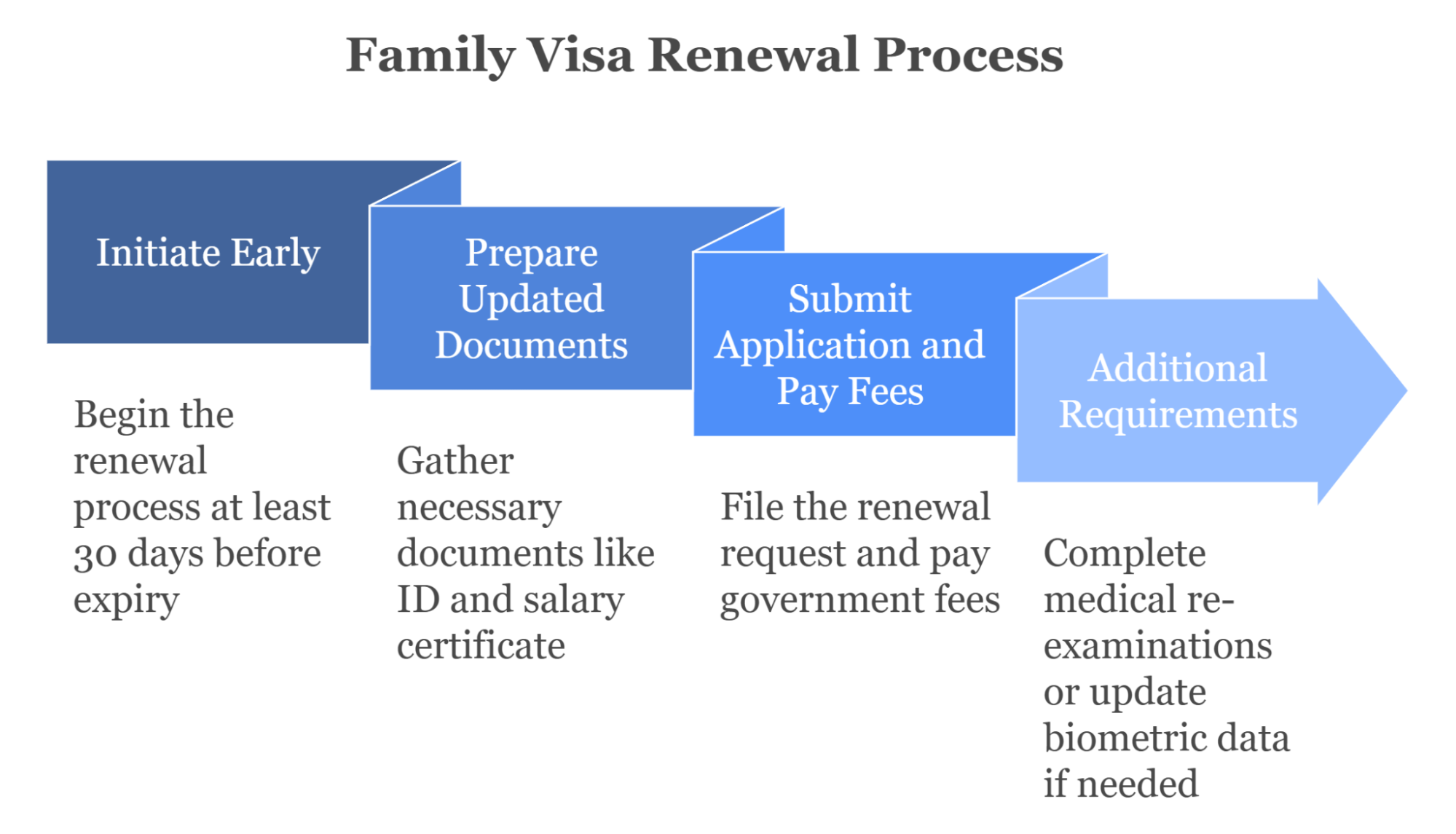
Obtaining a family visa in Kuwait is an essential process for expatriates and residents seeking to reunite with their immediate family members.
The government offers sponsorship options that allow eligible individuals to bring their spouse and children to reside legally in the country.
This guide outlines the key requirements, application procedures, and important regulations involved in securing a family visa in Kuwait, ensuring a smooth and compliant relocation experience. To begin the sponsorship process, it's crucial to apply for Kuwait Visa through the proper legal channels and provide all necessary documentation for approval.
Who Can Apply?
Family visas in Kuwait are available to individuals who meet specific eligibility criteria set by the Ministry of Interior. These criteria apply to both the sponsor and the dependents.
✅ Eligible Sponsors |
👨👩👧 Eligible Dependents |
|
|
Required Documents for Kuwait Family Visa
To apply for a Kuwait family visa, both the sponsor and the dependent must submit complete and properly attested documents.
These support the application by proving eligibility, relationship, and compliance with immigration requirements. Below is a concise list of all necessary documents.
👤 Sponsor's Documents

- Civil ID Copy: A valid copy of the sponsor's Kuwaiti Civil ID (Iqama).
- Passport Copy: Photocopy of the sponsor's passport, including the first and last pages.
- Work Permit (Izne Amal): A copy of the sponsor's work permit, indicating employment details.
- Salary Certificate: An official salary certificate issued by the employer, demonstrating that the sponsor meets the minimum income requirement.
- Educational Qualifications: A university degree relevant to the sponsor's profession, attested by the Ministry of Foreign Affairs (MOFA) in the sponsor's home country and in Kuwait. Certain professions may be exempt from this requirement, provided a company letter stating the profession is submitted.
- Proof of Accommodation: Documentation such as a rental agreement or utility bill confirming the sponsor's residence in Kuwait.
- Relationship Affidavit: For spouses, an attested marriage certificate. For children, an attested birth certificate. In cases where the spouse's name is not mentioned in the passport, a relationship affidavit from the embassy, attested by MOFA, is required.
- Completed Visa Application Form: Accurately filled out, ensuring all details match the supporting documents.
👨👩👧 Dependent's Documents

- Passport Copy: Photocopy of the dependent's passport, valid for at least six months.
- Passport-Size Photographs: Recent photos with a white background, as per Kuwaiti standards.
- Medical Examination Report: A medical fitness certificate from an authorized health center.
- Police Clearance Certificate (PCC): May be required for adult dependents, depending on nationality and age.
- Proof of Relationship: As mentioned above, attested documents confirming the familial relationship.
Family Visa Application Process in Kuwait
Applying for a family visa in Kuwait involves several administrative steps. The sponsor must ensure all documents are complete, properly attested, and submitted to the appropriate authority.
Step 1: Prepare and Submit the Application
Gather all required documents for both the sponsor and dependents, including passport copies, salary certificate, proof of relationship, and attested translations if needed.
Submit the complete application at the General Department of Residency Affairs in your governorate to begin the process.
Step 2: Pay Fees and Complete Medical Checks
After submitting the application, pay the visa processing fees based on the number and type of dependents. Dependents must also undergo a medical examination at an approved health center to confirm they meet Kuwait’s health requirements.
Step 3: Finalize Residency with Fingerprinting and Visa Stamping
Once approved, dependents must complete biometric fingerprinting and attend an immigration appointment for residency stamping in their passports. This final step confirms their legal residency status in Kuwait.

Validity and Renewal of Family Visa in Kuwait
A family visa in Kuwait grants eligible dependents legal residency under the sponsorship of a Kuwaiti resident. Maintaining the visa’s validity and ensuring timely renewal are essential to remain compliant with Kuwait’s residency regulations.
Visa Validity
The family residence visa is generally issued for a period of one to three years, depending on the sponsor’s residency status and the discretion of the Ministry of Interior. The visa’s duration cannot exceed the sponsor’s own residency permit.
- The dependent’s visa becomes valid after successful medical clearance, biometric registration, and residency stamping.
- The residency status must be maintained throughout the dependent’s stay to avoid legal issues.
Renewal Process
Family visa holders must ensure that their residency is renewed before the expiry date. The sponsor is responsible for initiating and completing the renewal process through the General Department of Residency Affairs.
Renewal Steps:
- Initiate Early:Begin the renewal process at least 30 days before the visa expiry to avoid delays or penalties.
- Prepare Updated Documents: Submit the necessary documents, such as:
- Submit Application and Pay Fees: File the renewal request at the relevant immigration office and pay the applicable government fees.
- Additional Requirements (if applicable): Certain cases may require medical re-examinations or updated biometric data, depending on the dependent’s age or time since last processing.
|
✓ Valid Civil ID and residency of the sponsor ✓ Updated salary certificate (if required) ✓ Proof of ongoing family relationship |

Processing Time and Fees for Kuwait Family Visa
Understanding the expected processing time and applicable fees is essential when applying for a Kuwait family visa. While these details can vary depending on individual circumstances, being prepared helps ensure a smoother application experience.
🕒 Processing Time |
💰 Application Fees |
|
The processing time for a Kuwait family visa can vary based on several factors, including the completeness of the application, the sponsor’s eligibility, and the workload at the General Department of Residency Affairs. |
Family visa applications in Kuwait involve standard government fees, which must be paid at the time of application submission and upon residency stamping. These may include:
|
Dependent Rules & Limitations in Kuwait
These regulations define what dependents are allowed to do during their stay and help ensure that their residency remains valid under the sponsorship system.
- Employment Restrictions: Dependents holding a family (dependent) visa are not allowed to work in Kuwait unless they obtain a valid work permit and transfer their residency to a local employer. Working without proper authorization is a legal violation and may result in fines or deportation.
- Education Access: Dependent children may enroll in private or international schools in Kuwait. Public schools are typically reserved for Kuwaiti nationals, though exceptions may exist for GCC citizens.
- Residency Linked to Sponsor: A dependent’s visa is directly tied to the sponsor’s residency status. If the sponsor's residency is canceled, the dependent's residency will also become invalid, and they may be required to leave the country unless a new sponsor is secured.
- Travel and Re-entry: Dependents may leave and re-enter Kuwait as long as their visa remains valid. However, extended stays outside Kuwait without valid justification may impact their residency status. It's important to adhere to maximum stay limits abroad, as set by immigration authorities.
- Change of Status: If a dependent wishes to work or study independently, they must change their visa type and update their sponsorship through the proper legal channels. This includes transferring to a work visa or student visa as applicable.
Common Reasons for Kuwait Family Visa Rejection

Applying for a family visa in Kuwait requires meeting specific eligibility and documentation standards.
Failure to meet these criteria can result in rejection. Understanding the most common reasons for denial helps applicants better prepare and avoid unnecessary delays.
- Incomplete or Incorrect Documentation: Submitting missing, outdated, or improperly attested documents is one of the most common reasons for rejection. All certificates (e.g., marriage, birth) must be properly legalized and translated into Arabic if required.
- Sponsor's Ineligibility: If the sponsor does not meet the required criteria, such as residency status, profession, or minimum salary, authorities may deny the application.
- Discrepancies in Information: Mismatched details between documents (e.g., names, dates, relationship status) can raise red flags and lead to rejection due to suspected fraud or lack of clarity.
- Overstaying or Visa Violations: If the applicant or sponsor has a history of overstaying or previous immigration violations in Kuwait or elsewhere, the application may be declined.
- Security or Health Concerns: Failure to pass the required medical examination or being flagged during a background check may result in visa denial on public health or security grounds.
- Exceeding Family Quota: In some cases, sponsors may be limited in the number of dependents they can sponsor based on their salary or housing status. Exceeding this quota can lead to rejection.
Frequently Asked Questions
No. A dependent on a family visa cannot work in Kuwait unless they transfer to a valid work visa sponsored by an employer. Working without proper authorization is illegal and may lead to penalties or deportation.
Processing times vary depending on document completeness and the workload of immigration authorities. Applications that are accurate and fully supported are typically processed within a few weeks, but delays can occur.
If the sponsor changes employers, they must transfer their residency first, then update the dependent’s visa under the new employer. Failing to update this sponsorship link may invalidate the dependent’s residency.
Yes, as long as the sponsor meets the income and housing requirements and provides all necessary documents for each dependent. Each individual will have their own application and residency file.
Yes, as long as the family visa and residency permit are valid. However, prolonged absence from Kuwait may result in automatic cancellation of the visa, depending on official regulations.
In most cases, only immediate family members such as a spouse and children are eligible for sponsorship. Sponsoring parents or siblings may be allowed only in rare circumstances and often requires special approval.
You may appeal the decision or reapply after correcting the issue that led to the rejection. It’s advisable to consult a licensed immigration advisor or visit the General Department of Residency Affairs for guidance.
Yes. In most cases, health insurance is mandatory and must be paid during the visa issuance or renewal process. It covers access to medical care in Kuwait’s public health system.
Content Disclaimer: Although this information was last updated in June 2025 , we recommend verifying with the appropriate agencies, embassies, and airlines to ensure complete accuracy regarding your travel plans.

To help us improve